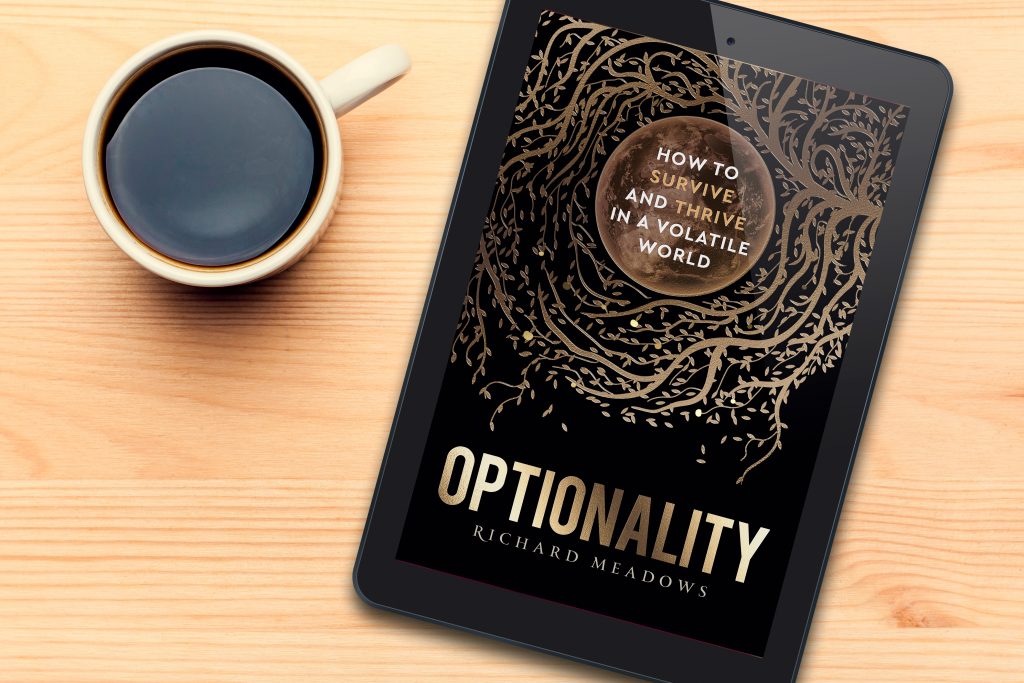Optionality (How to Survive and Thrive in a Volatile World) is a book by finance journalist Richard Meadows about how to succeed in a volatile world. It’s about 438 pages long with 6 chapters. Some themes in the book are FIRE, working, etc. The author maintains a blog at The Deep Dish.
1. Eudaimonia (Flourishing)
State of flourishing
Possibility tree:
- Beach 🏖️
“I saw my life branching out before me like the green fig tree in the story.” – Sylvia Plath
Consumer capitalism can steal money, time, attention
- a) Have more money (healthy bank balance)
- b) Require less of it (simple tastes)
- Currencies of life – time, health, mental bandwidth, energy, status, hedonic pleasure, meaning
- Min-maxing
- Mr Money Mustache 〰️
- Acting dead
- Youth + mobility
- Thoreau was kind of a hypocrite
- The beauty of minimalism is the sense of possibility it creates
- Frugality is about opening your options
Opening your options:
- High-quality options = doors that could lead to treasure chests 💰
- Low-quality options = dead ends, bottomless pits of doom
- Risk management
- Asymmetrical relationship – motorcycles 🏍️, drugs
- Modest returns – Uber, stocks, TV
- Sexy relationship – side-hustles, VC style bets, books (view quake), messaging strangers
Abundance:
- Kidney stones
Hedonic treadmill | adaptation
- Peacock tail 🦚 – signaling
Wireheading | instant happy
The physiology of motivation – 1954 (Stellar)
4 factors of optionality:
Financial capital
Social capital
Knowledge capital
Health capital
Capping downside more important
Winning is about non-losing
Matthew effect (Matthew 25:29)
2. Akrasia (Weakness of Will)
State of acting against one’s better judgment
- There is no single you
- Captain 🚢 (ego) | Old Timer 👴 (superego) | Monkey 🐒 | Reptile 🦎 (id)
- Goal setting
- Goodhart’s Law – when a KPI becomes a target, it’s no longer a good KPI
Siren song:
Geoffrey Miller – self-stimulating | status-seeking
- $5 per kg of necessities
- Faux optionality | paradox of choice
10 creatures of habit:
- Choice architecture
- Trivial inconvenience – friction
- Ulysses contract
- Set + forget
- Cue, routine, reward
11. Social contagion
3. Praxis (Practice)
Barbell strategy:
Expectations
Create artificial scarcity to increase gratitude
Halo effect 😇
Testosterone – belly fat – aromatase – oestrogen
Lindy effect: the longer an idea/thing stays around – the longer we can predict it to survive
Social capital:
- Get in at ground floor
- Max exposure to serendipity
- Dunbar’s number – 150 casual friends
4. Rhizikon (Risk)
Debt
5. Kairos (Right Moment)
Exploring vs. exploiting
Trapped in local maxima vs. global maximum due to premature exploitation
PG – start with something small
- Follow your blisters
Effectuation:
Sarasvathy 4 principles
- Bird-in-hand
- Lemonade principle 🍋
- Crazy quilt
- Affordable loss
A time to obey and rebel
Better to rule in hell (Paradise Lost – Milton)
F you money:
- F you frugality
- Ben Franklin
- F you career capital
Archetypes:
- Peter Pan man child
- Trustafarian wanderer
- Constantly dating New Yorker
- Dilettante who flits from job to job
- Early retiree who goes into a funk
Escapism
Or get optionality to lever yourself into an enjoyable career
- Flow states
- Other people
- Hierarchy
- Impact
(Workism) – Derek Thompson
“Freedom is the power to choose our own chains” – Rousseau
6. Telos (Completion)
Status games
Conspicuous simplicity
Conclusion
I think the book is OK. It’s a little edgy but there are some OK ideas floating around in it. I’d give it ★★★☆☆.
One great idea from Richard is the concept of an idea quake (an idea that changes your perspective on things).
References
- The Secret Life of Walter Mitty
- Miller – Spent Speed Summary
- Nudge – Thaler
- Book Review of Optionality


Leave a Reply